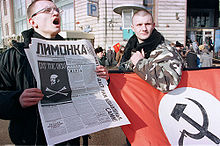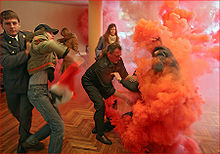- National Bolshevik Party
-
National Bolshevik Party 
Leader Eduard Limonov Founded 1992 Dissolved 2010 Headquarters Moscow Ideology National Bolshevism,
Eurasianism[1],
FascismPolitical position Syncretic International affiliation Unknown Website www.nazbol.ru The National Bolshevik Party (NBP, Russian: Национал-большевистская партия, НБП, also known as Natsbol) was a Russian political party. Its political program is National Bolshevism.[citation needed] The NBP is a prominent member of The Other Russia coalition of opposition parties. There are also smaller NBP groups in other countries.
In Russia, the organization has been banned, and has never been officially registered as political party. Since being banned, its membership has declined. The NBP's preferred political activity has consisted of direct action stunts, mostly against prominent political figures.
Its official organ is the journal Limonka (Лимонка). The name is a play of words on Limonov and is idiomatic Russian for grenade. It was forced to change its name after the authorities banned it for "promoting extremism and hatred". The main editor of Limonka for many years was Alexei Tsvetkov (Алексей Цветков).[2]
Contents
Political programme
 Members of the National Bolshevik party at a protest rally in Moscow with a copy of the "Limonka" newspaper. Photo by Mikhail Evstafiev
Members of the National Bolshevik party at a protest rally in Moscow with a copy of the "Limonka" newspaper. Photo by Mikhail Evstafiev
The National Bolshevik Party advocates the creation of a Russian-dominated empire that would include all of Europe, as well as northern and central Asia.[3] It is vehemently opposed to American foreign policy, and believes that a Eurasian empire would be an essential counterbalance to capitalist global domination. However, when Aleksandr Dugin left the NBP to create his own party called Eurasia, the NBP lessened the emphasis on a geo-political agenda in favor of a national one, concentrating on the defence of Russian minorities in the former Soviet Union republics, and on opposition to the political regime in Russia. Limonov denounced Dugin's conservatism and submissiveness to the regime.
The NBP has replaced its aggressive Eurasianist and imperialist nationalism with a Russian territorial nationalism. It has criticized Lithuania and Estonia for degrading Russian-Soviet World War II veterans and memorials, and for legislation that banned Soviet symbols such as the hammer and sickle and the red star, which placed them on par with the swastika and other Nazi imagery.[4]
It is highly critical of the government of Vladimir Putin, and considers state institutions such as the bureaucracy, the police and the courts to be corrupt and authoritarian.
History
The NBP has been led by Eduard Limonov since its founding in 1992 as National Bolshevik Front, as an amalgamation of six minor groups.[5] Aleksandr Dugin was amongst the earliest members, and was instrumental in convincing Limonov to enter the political arena. The party first attracted attention in 1992 when two members were arrested for possessing grenades, although Limonov argued that they had been planted. The incident achieved little, apart from giving the NBP some publicity for a boycotting campaign they were organising against Western goods.[6]
In 1992, the NBF joined the National Salvation Front coalition, which was supported by Belgian fascist Jean-François Thiriart.[7] When others within the coalition began to speak out against the NBF, it withdrew from the alliance.[8] The resulting fallout led the NBP to produce a document entitled Limonov vs. Zhirinovsky which attacked the leader of their former allies, the Liberal Democratic Party of Russia, by stating that "a Jew masquerading as a Russian nationalist is a sickness, a pathology" (Zhirinovsky having a Jewish background).[9] Since this aborted alliance, the NBP attempted to reach a new deal with Russian National Unity in 1999, but this came to nothing.[10]
Although these early actions show some alignment and sympathy with nationalists groups, a split occurred in the NBP in the 2000s which changed this to an extent. Opposed to the Vladimir Putin regime in Russia, Limonov has somewhat liberalized the NBP, and joined forces with leftist and liberal groups in Kasparov's United Civil Front to fight Putin.
 National Bolsheviks attack a polling station in Odintsovo, Moscow Oblast during Russian legislative election, 2007 protesting their ban[11]
National Bolsheviks attack a polling station in Odintsovo, Moscow Oblast during Russian legislative election, 2007 protesting their ban[11]
NBP members took over the Ministry of Health in Moscow on August 2, 2004 in order to protest the cancellation of social benefits in Russia. This was followed by an attempt to occupy Putin's office in December of the same year, although it was put down, and 30 arrests were made.[12]
The NBP was liquidated by a lower court in June 2005, but the Russian Supreme Court overturned the ban on August 16, 2005. In November 2005, the Russian Supreme Court upheld a ban on the National Bolshevik Party on the grounds that it violated the law on political parties, by calling itself a party without being registered as such.[13]
A group of NBP followers disagrees with Limonov's new strategy of seeking political alliances with pro-Western and pro-market liberal-democratic forces. They call themselves NBP bez Limonova (NBP without Limonov) or simply National Bolsheviks, because they regard themselves as the real followers of National Bolshevism, accusing Limonov of betraying party's original ideas in order to gain personal visibility. In August 2006, an anti-Limonovist faction of the NBP that is more right-wing, anti-liberal, anti-left, anti-Kasparov and, aggressively nationalist formed the National Bolshevik Front.[14]
On November 7, 2006, police detained 27 NBP members after an office break-in on the eve of the celebration of the Bolshevik Revolution.[15] In 2007, the NBP took part in the Dissenters March and subsequent demonstrations against the government.[16] The NBP was outlawed again on 19 April 2007.[17]
International groups
Several much smaller groups known as the National Bolshevik Party exist in countries such as Latvia, Moldova, Sweden, Ukraine, Kazakhstan, Azerbaijan, Estonia, Serbia, Poland, Czech Republic, Slovakia, United Kingdom, the United States, Canada and Israel.[18] They are often made up of Russian immigrants.
In Belarus, a Pentecostal church in Minsk was vandalised in 2006 with the NBP emblem drawn on its walls.[19] The NBP is not, however, officially registered in the country. This followed a similar incident at the Latvian embassy in the city the previous year.[20] NBP members have held office in Riga, Latvia.[21] This Latvian branch has variously been led by Konstantin Mihailuk and Vladimir Linderman. Although it has made some noted publicity stunts, it is largely marginal in Latvia.[22] Two Russian party members were detained in May 2007 while attempting to illegally cross the border between the two countries.[23]
In Latvia NBP is active in anti-capitalist demonstrations and in blockades against SS veterans' parades during Latvian Legion Day.[24]
In Lithuania, National Bolsheviks had appeared in 2005 in Visaginas and Klaipėda. One of their most notable actions was against education reform.[25]
The Moldovan NBP was refused registration as a political party in 2005, so it registered as a non-governmental organization, with Transnistria as its main centre of activity.
In Ukraine, the NBP joined other small parties in signing a Declaration of the Kiev Council of Slav Radical Nationalists in 1996, in an initiative led by the Ukrainian National Assembly.[26] The Ukrainian NBP, which is largely based in the east of the country is active in anti-UPA[27] and anti-NATO[28] demonstrations. During the Orange Revolution the Ukrainian NBP decided not to support Yanukovych or Yushchenko.
Incidents
In May 2011, NBP activists attacked the Embassy of Serbia in Moscow.[29][30]
References
- ^ http://www.nazbol.ru/ Program
- ^ Вавилон: Литературная жизнь Москвы 1 - 15 february 1998
- ^ Program of the National-Bolshevik Party
- ^ Lithuania Bans Soviet and Nazi Symbols
- ^ M.A. Lee, The Beast Reawakens, 1997, p. 314
- ^ M.A. Lee, The Beast Reawakens, 1997, p. 320
- ^ M.A. Lee, The Beast Reawakens, 1997, p. 321
- ^ M.A. Lee, The Beast Reawakens, 1997, pp. 328-9
- ^ M.A. Lee, The Beast Reawakens, 1997, p. 329
- ^ M. Vladimirova, 'National Bolshevik Party Ban Could Herald Wider Political Repression', Searchlight, August 2005, p. 24
- ^ По факту нападения "лимоновцев" на избирательный участок возбуждено уголовное дело Gazeta.ru 12 March 2007
- ^ J. Raymond, 'Far Right Bids to Set Agenda', Searchlight, February 2005, p. 27
- ^ RIA Novosti - Russia - UPDATE: Russian Supreme Court upholds ban on National Bolshevik Party
- ^ "An Interview with the Leader of the NBF (Roman Golovkin)
- ^ RIA Novosti - Russia - Police detain 27 National Bolsheviks in office break-in attempt
- ^ Police Clash With Anti-Kremlin Protesters, Radio Free Europe/Radio Liberty, March 3, 2007
- ^ "Russia court outlaws radical political party", Reuters (The Globe and Mail), April 19, 2007.
- ^ http://eng.nbp-info.ru/409.html
- ^ 'National Bolsheviks Accused of Vandalizing Beleaguered Pentecostal Church'
- ^ 'Far-left group attacks Latvian embassy in Minsk'
- ^ Stephen D. Shenfield,'Russian Fascism: Traditions, Tendencies, Movements', p. 190
- ^ N. Muizneiks, 'Latvia' in C. Mudde, Racist Extremism in Central and Eastern Europe, pp. 101-128
- ^ 'Latvia’s security services fear arrival of large number of weapons ahead of May 9'
- ^ http://nbp-info.ru/new/photo/160306_riga/ День сопротивления в Риге. 16 марта 2006
- ^ http://img15.imageshack.us/img15/2353/eredr3.jpg Flyer of Lithuanian National Bolsheviks
- ^ Ukraine
- ^ АНТИ-УПА-2009
- ^ «НАТО-STOP!»
- ^ Embassy of Serbia in Moscow have taken under heavy guard
- ^ Black paint thrown at Serbian embassy in Moscow
External links
- National Bolsheviks
- National Bolshevik Party website (archived)
- NBP-INFO - National-Bolshevik blog
- Who Are the National-Bolsheviks? by Andrei Dmitriev
- Russia: National Bolsheviks, The Party Of 'Direct Action' from Radio Free Europe/Radio Liberty
- Russian fascism: traditions, tendencies, movements by Stephen Shenfield
Russian nationalism Moderate: People's Union | Great Russia | Cathedral of the Russian people | ROD | NAROD | PPRC «Rus» | NPR | ONS | Russian Nationwide Union | Congress of Russian Communities
Radical: Pamyat | NNP | NBP | NBF | National Sovereignty Party of Russia | RNE | DPNI | Slavic Union | National Union | NSO | Nordic Brotherhood | NSPR | Freedom Party | NS/WP | RNS
Russian March: 2005 • 2006 • 2007 • 2008 • 2009 • 2010 Russian political parties and movements, incl. non-registered organizations
Russian political parties and movements, incl. non-registered organizationsNon-registered parties and political movements Solidarnost · The Other Russia · National Bolshevik Party · Great Russia · Russian All-People's Union · Pirate Party · Party of Popular Freedom · Union of Social DemocratsCategories:- National Bolshevism
- Political parties in Russia
- Russian nationalism
- Political parties established in 1992
- Banned political parties
- Russian opposition groups
- Communist parties
- Nationalist parties
Wikimedia Foundation. 2010.
